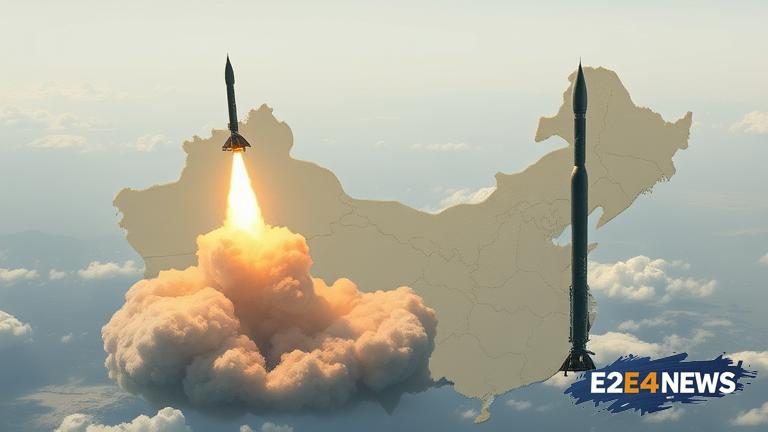China’s nuclear program has been a subject of interest and concern for Western nations, particularly the United States, in recent years. Despite warnings and pressure from the international community, China has refused to separate its conventional and nuclear missile capabilities, leaving many to wonder about the country’s intentions. The Chinese government has consistently maintained that its nuclear program is for defensive purposes only, but the lack of transparency and clarity has raised suspicions about its true goals. The country’s nuclear arsenal is estimated to be around 350 warheads, which is significantly smaller than those of the United States and Russia, but still poses a significant threat to regional and global security. China’s nuclear program is also closely tied to its conventional military capabilities, making it difficult to distinguish between the two. This ambiguity has led to concerns that China may be using its conventional missiles to deliver nuclear warheads, which could have devastating consequences. The United States and other Western nations have repeatedly called on China to increase transparency and separate its conventional and nuclear missile capabilities, but Beijing has refused to comply. China’s reluctance to do so has sparked a debate about the country’s intentions and the potential consequences of its actions. Some experts believe that China’s nuclear program is designed to counter the United States’ military presence in the region, while others argue that it is intended to provide a deterrent against potential threats from neighboring countries. The lack of clarity and transparency has also raised concerns about the risk of accidental nuclear war, particularly in the event of a conflict between China and the United States. The international community has called on China to sign the Comprehensive Nuclear-Test-Ban Treaty (CTBT) and to engage in diplomatic efforts to reduce the risk of nuclear conflict. However, China has refused to sign the treaty, citing concerns about the verification process and the potential impact on its national security. The country’s nuclear program is also closely tied to its economic and technological development, with many of its nuclear facilities and technologies being used for both military and civilian purposes. This has raised concerns about the potential for nuclear proliferation and the risk of nuclear materials falling into the wrong hands. Despite these concerns, China has continued to expand its nuclear program, with plans to increase its nuclear arsenal and develop new nuclear technologies. The country’s nuclear ambitions have also been driven by its desire to become a major world power and to challenge the dominance of the United States and other Western nations. The international community has called on China to exercise restraint and to engage in diplomatic efforts to reduce the risk of nuclear conflict, but Beijing has refused to back down. The situation has been further complicated by the ongoing tensions between China and the United States, with both countries engaging in a series of military exercises and diplomatic maneuvers in the region. The potential consequences of China’s nuclear program are far-reaching and could have a significant impact on regional and global security. The international community must continue to pressure China to increase transparency and to separate its conventional and nuclear missile capabilities, in order to reduce the risk of nuclear conflict and to promote regional and global stability. The situation is complex and multifaceted, and will require careful diplomacy and cooperation to resolve. The United States and other Western nations must work together to engage China in diplomatic efforts and to promote transparency and accountability in its nuclear program. The future of regional and global security depends on it. China’s nuclear program is a critical issue that requires immediate attention and action from the international community. The country’s refusal to separate its conventional and nuclear missile capabilities has raised concerns about its intentions and the potential consequences of its actions. The international community must continue to pressure China to increase transparency and to engage in diplomatic efforts to reduce the risk of nuclear conflict.
